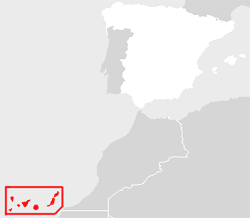Over 1000 illegal immigrants arrived at Canary Isles this weekend
Monday, September 4, 2006

A high number of illegal immigrants, mainly of African origin, arrived on the beaches of the Canary Islands this weekend. Although the exact number reported varies, it seems that more than 1000 have been registered. One person did not survive the trip.

Earlier this year, in the weekend of May 12, 974 immigrants set foot on different isles. This Saturday alone, 674 foreigners have been found without the proper documents. Early August it already became clear that immigration numbers were increased dramatically, when officials reported a 307% increase (14,589 immigrants, compared to 4,751 during the same period in 2005).
A special session of the Canarian regional government pertaining to the immigration question is planned for Tuesday. Some Spanish sources expect these events to reopen the political debate on this issue.
The immigrants generally leave the African continent in overcrowded canoes, embarking on a dangerous boat trip. They try to reach the archipelago, which, being part of Spain, serves as an outpost for immigration into the European Union. Boats are often intercepted in Spanish territorial waters. On the shore, humanitarian organisations like the Red Cross are waiting to provide the first care to the travellers. On arrival, hypothermia, dehydration and minor injuries are the most common problems.
Thereafter, officials try to establish the immigrant's identity. Most of them have no legal grounds for immigration, but cannot be repatriated because they conceal their identity, or because they are less than 18 years old. In that case they are taken to a state Foreigner Internment Center, where they can be held up to 40 days. Since Spain lacks bilateral agreements with most countries around the Mediterranean Sea except Morocco, they cannot return the immigrants without negotiations. If they aren't arrested upon arrival, or when the procedure doesn't result in repatriation, they can freely enter Spain and the European Union.
Sources
edit- "Canarias recibe más de 1.400 inmigrantes indocumentados sólo durante el fin de semana" — El Pais, September 3, 2006 (Spanish)
- "Llegan a Canarias más de 1.400 inmigrantes, la mayor oleada en dos días" — El Mundo, September 4, 2006 (Spanish)
- "Canarias vive la mayor oleada en 48 horas con 1.198 inmigrantes" — ABC, September 3, 2006 (Spanish)
- "Y después del cayuco, ¿qué?" — El Mundo, September 1, 2006 (Spanish)
- "Illegal immigrants shipping to Canary Isles triple" — Expatica, August 9, 2006
| This page has been automatically archived by a robot, and is no longer publicly editable.
Got a correction? Add the template {{editprotected}} to the talk page along with your corrections, and it will be brought to the attention of the administrators. Please note that the listed sources may no longer be available online. |